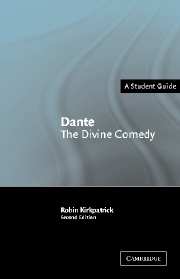4 - After Dante
Published online by Cambridge University Press: 05 June 2012
Summary
It is more accurate to speak of the impact of The Divine Comedy upon subsequent generations than of its influence. Unlike his near-contemporaries Petrarch and Boccaccio, Dante established no literary school; nor has the effect of the Comedy ever been to slip half-noticed – as the word ‘influence’ might suggest – into the sensibility or style of its successors. (In that sense, the Vita nuova has been more of an influence than the Comedy.) In Italy and Europe at large, particular authors have at particular times returned quite consciously to Dante, as if in sudden rediscovery, and taken him as a guide in confronting some specific problem in the sphere of art, philosophy, politics or even personal misfortune.
The list of those who have responded in this way would extend beyond Italy to all the major literatures of Europe, and – to speak of English literature alone – would run from Chaucer to Seamus Heaney. Moreover, any inquiry into this tradition would be complicated by the fact that the philosophical and religious beliefs of those who have read the Comedy most devotedly have rarely proved consistent with Dante's own; Dante would surely not have recognised the uses to which he has been put by English Romantics such as Shelley or German thinkers such as Hegel or Schelling. To analyse such instances it would be necessary to concern oneself, on the level of cultural history, with the development and the recurrent tensions of 700 years of Western literature: Dante not only summarises the Late Medieval World but also anticipates many of the issues which have continued to concern us since the certainties of that world passed away.
- Type
- Chapter
- Information
- Dante: The Divine Comedy , pp. 110 - 114Publisher: Cambridge University PressPrint publication year: 2003

